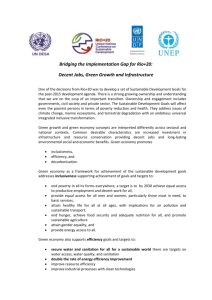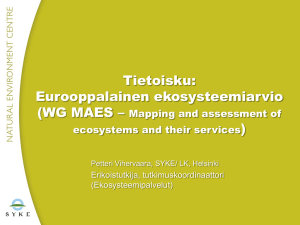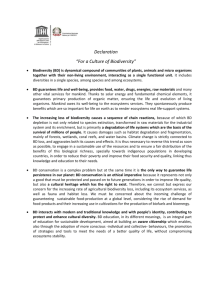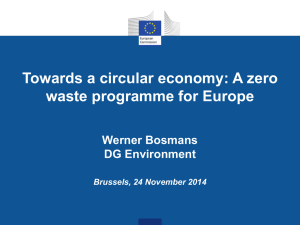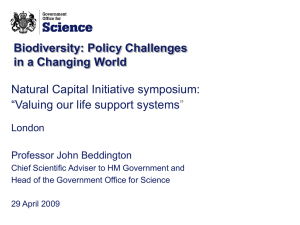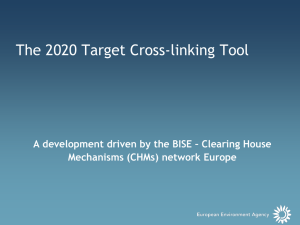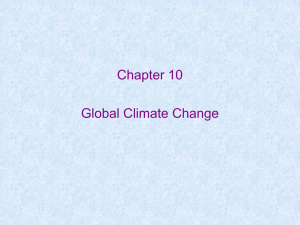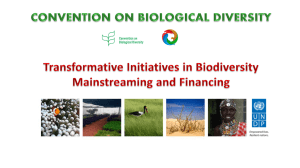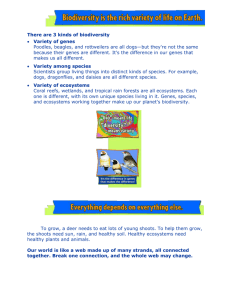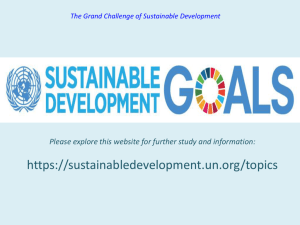NGO MG Draft Statement OWG 10 1
advertisement
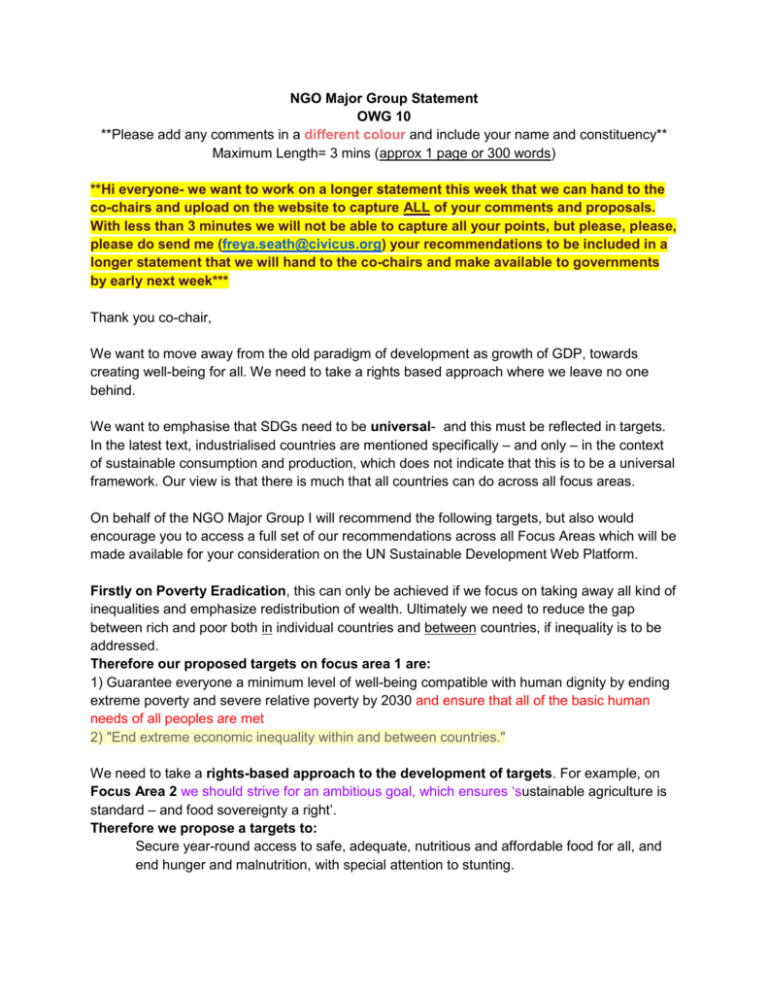
NGO Major Group Statement OWG 10 **Please add any comments in a different colour and include your name and constituency** Maximum Length= 3 mins (approx 1 page or 300 words) **Hi everyone- we want to work on a longer statement this week that we can hand to the co-chairs and upload on the website to capture ALL of your comments and proposals. With less than 3 minutes we will not be able to capture all your points, but please, please, please do send me (freya.seath@civicus.org) your recommendations to be included in a longer statement that we will hand to the co-chairs and make available to governments by early next week*** Thank you co-chair, We want to move away from the old paradigm of development as growth of GDP, towards creating well-being for all. We need to take a rights based approach where we leave no one behind. We want to emphasise that SDGs need to be universal- and this must be reflected in targets. In the latest text, industrialised countries are mentioned specifically – and only – in the context of sustainable consumption and production, which does not indicate that this is to be a universal framework. Our view is that there is much that all countries can do across all focus areas. On behalf of the NGO Major Group I will recommend the following targets, but also would encourage you to access a full set of our recommendations across all Focus Areas which will be made available for your consideration on the UN Sustainable Development Web Platform. Firstly on Poverty Eradication, this can only be achieved if we focus on taking away all kind of inequalities and emphasize redistribution of wealth. Ultimately we need to reduce the gap between rich and poor both in individual countries and between countries, if inequality is to be addressed. Therefore our proposed targets on focus area 1 are: 1) Guarantee everyone a minimum level of well-being compatible with human dignity by ending extreme poverty and severe relative poverty by 2030 and ensure that all of the basic human needs of all peoples are met 2) "End extreme economic inequality within and between countries." We need to take a rights-based approach to the development of targets. For example, on Focus Area 2 we should strive for an ambitious goal, which ensures ‘sustainable agriculture is standard – and food sovereignty a right’. Therefore we propose a targets to: Secure year-round access to safe, adequate, nutritious and affordable food for all, and end hunger and malnutrition, with special attention to stunting. Implement sustainable agriculture and food systems, including livestock, fisheries and forestries. Halve food losses and waste Reshape trade policies and mitigate food price volatility. On Focus Area 6- Water and Sanitation as a goal would need to ensure it includes targets on hygiene. We also need to cut water wastage and improve water efficiency. We propose ambitious targets to includeBy 2030: • eliminate open defecation; • achieve universal access to basic drinking water, sanitation and hygiene for households, schools and health facilities; • halve the proportion of the population without access at home to safely managed drinking water and sanitation services; and to - Cut water wastage and improve water efficiency, year on year, so as to end over- abstraction of freshwater supplies by 2030, consistent with maintenance of biodiversity in all surface waters and long term sustainability of groundwater supplies, and start recovery of over-exploited aquatic ecosystems On Focus Area 7: sustainable development requires a complete transition away from fossil fuels and to renewable energy economies. Alongside a huge expansion in energy access in developing countries, we need a rapid global transition to cleaner, climate-friendly energy sources. Importantly, we also need a large and sustained increase in the rate at which energy efficiency improves everywhere, because all energy sources – including renewables – consume resources at some stage and can have damaging environmental impacts. We therefore propose a target on Focus Area 7 to: Ensure universal phase out of fossil fuel subsidies by 2020. And targets to: Reduce the total energy use of developed country by x % and of developing countries x % until 2030; Supply x % of total energy use by renewable energy sources by 2030; and strive to transition to a zero carbon footprint as rapidly as possible In relation to several focus areas, NGOs believe reducing the impact of disasters is a prerequisite for the SDG’s central objective of eradicating poverty, as well as achieving the inclusive economic growth that is key to shared prosperity, and ensuring the achievement of all other post-2015 goals. We therefore propose a Target: Reduce the impact of disasters on poverty eradication and economic growth, including the impact on poor men and women and protect productive assets, including livestock, working animals, tools and seeds. Finally we want to emphasize that goals should build on existing UN declarations, agreements and conventions- and Targets, Indicators and Review processes should look into the extent to which all existing agreements are being met. On this point, in particular when addressing the Focus Area 17 on Ecosystems and Biodiversity we should look to include already globally agreed Aichi Biodiversity Targets, for example: Aichi target 15: By 2020, ecosystem resilience and the contribution of biodiversity to carbon stocks has been enhanced, through conservation and restoration, including restoration of at least 15 per cent of degraded ecosystems, thereby contributing to climate change mitigation and adaptation; combating desertification; Thank you and please do look for a full set of our NGO recommendations online. *** looking at the life course from birth to death, NGOs view sustainable development from the perspective of cluster cross cutting by subject and by age - looking at the life course from birth to death. What you eat, what you know, what your economic status is, where you live often carries over through your life and impacts you at all ages. It is important to recognize this approach as it validates integrated action. Proposed target Given the fact that one billion people move within countries and across borders to address inequalities, escape conflict and climate degradation and to secure social protection for themselves and their families, governments need to proactively allow for movement to seek decent work and healthy living. Mary Jo Toll Proposed target: Guarantee a minimum level of well-being for all by ending extreme income poverty and reducing relative poverty and income inequality by 2030. Kathy: Add the support for social protection floor for older people. Target area 2: Goals should build on existing United Nations declarations, agreements and conventions, and bring renewed energy in their implementation and close existing gaps. The Targets, Indicators and Review processes should look into the extent to which both the SDGs and all existing agreements are being met. In particular when addressing the focus area 17 on Ecosystems and Biodiversity we should look to include already globally agreed Aichi Biodiversity Targets, for example: Proposed target (Aichi target 5): By 2020, the rate of loss of all natural habitats, including forests, is at least halved and where feasible brought close to zero, and degradation and fragmentation is significantly reduced. Or Aichi target 15: By 2020, ecosystem resilience and the contribution of biodiversity to carbon stocks has been enhanced, through conservation and restoration, including restoration of at least 15 (and preferably 100) per cent of degraded ecosystems, thereby contributing to climate change mitigation and adaptation; combating desertification; and creating a truly sustainable future. We need to recognise that humanity is confronted with increasing resource constraints,fuelled by unsustainable production and consumption patterns. To exceed social and environmental planetary boundaries is to compromise our own development and well-being, in the present and for future generations, as is currently illustrated by the multiple and interlinked social, environmental and economic crises. Humanity needs to recognize and respect the natural or common heritage of the Earth. We need a sustainable model of development and lifestyles; and the targets and indicators must be framed so as to fully address this and ensure that humanity lives within the carrying capacity of the earth. Target area 3: We need to take a rights-based approach to the development of targets. For example, focus area 2 on sustainable agriculture, food security and nutrition- we should aim for: For example, in focus area 2, we should strive for an ambitious goal on sustainable agriculture, food security and nutrition which includes targets to: eradicate hunger and improve nutrition, ensure food systems are stable, sustainable and produce enough nutritious food for all and ensure all people can access and consume adequate, affordable and nutritious food, so that the right to food can be realized for all. Proposed target: Sustainable agriculture is standard – food sovereignty a right Ensure the human right to sufficient, nutritionally adequate and safe food (through sustainable agricultural practices) FROM the FOOD/AG Cluster (Naiara Costa, WSPA): - Secure year-round access to food - Ensure small-scale food producers access to knowledge, productive resources and services - Implement sustainable agriculture and food systems, including livestock, fisheries and forestries. - Halve food losses and waste - Reshape trade policies and mitigate food price volatility. 6. Understanding that the majority of the worlds remaining resources are located in the lands of Original Nations and their Indigenous Peoples, a priority of respecting their effective stewardship will ensure the sustainability of those regions. From IOPA Target area 4: Sustainable development requires a complete transition away from fossil fuels and to renewable energy economies. Alongside a huge expansion in energy access in the developing world, we need a rapid global transition to cleaner, climate-friendly energy sources. But, as importantly, we need a large and sustained increase in the rate at which energy efficiency improves everywhere, because all energy sources – including renewables – consume resources at some stage and can have damaging environmental impacts. Proposed target: Ensure universal phase out of fossil fuel subsidies by 2020, reduce the total energy use of developed country by xx % and of developing countries xx % until 2030; supply xx % of total energy use by renewable energy sources by 2030; and strive to transition to a zero carbon footprint as rapidly as possible. Disasters have a major impact on poverty eradication and we would propose the following target: Target: Reduce the impact of disasters on poverty eradication and economic growth, including the impact on poor men and women and protect productive assets, including livestock, working animals, tools and seeds. [From WaterAid] Target Area 6: Water and Sanitation are vital to sustainable development. The focal area as identified to this point should be included as a goal in the post-2015 framework but should also ensure that it includes provision for hygiene as target within a dedicated goal. The Major Groups draw attention to the work conducted by 60 organisations facilitated by the World Health Organisation and UNICEF Joint Monitoring Programme. At the core of the Water and Sanitation goal should be ambitious targets to By 2030: • to eliminate open defecation; • to achieve universal access to basic drinking water, sanitation and hygiene for households, schools and health facilities; • to halve the proportion of the population without access at home to safely managed drinking water and sanitation services; to provide access to biological waste water treatment for all developing countries; and • to progressively eliminate inequalities in access.1 The Major Groups note that just 10 days ago, 57 member states gave their backing to a water and sanitation goal on World Water Day in a letter to all permanent representatives. The Major Groups welcome this ambition but call on member states to ensure that handwashing is not left out. 1 Available at http://www.wateraid.org/~/media/Files/Global/Post%202015/WASH-post-2015.pdf
